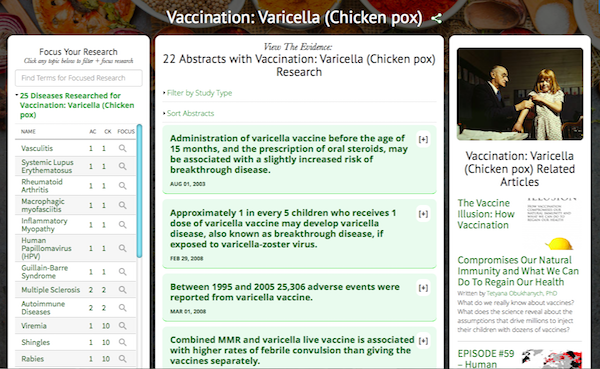
Study: Severe Breakthrough Varicella Occurring From Chickenpox Vaccination
Wednesday, March 29th 2017 at 7:45 am
Written By:
A recent review published in the journal Expert Review of Vaccines titled, “Severe varicella in persons vaccinated withvaricella vaccine (breakthrough varicella): a systematic literature review” [i] examined 34 articles published between 1974-2016 in order to better understand the range of severe complications of varicella among vaccinated persons.
Until now, no systematic review has been performed nor has an attempt been made to research the range of severe complications of varicella among vaccinated persons to evaluate the US varicella vaccination program. The United States was the first country to recommend a routine one-dose varicella vaccine program in 1996, then updated its recommendations to a routine two-dose program in 2006 [ii]
Within the systematic review, the authors identified 21 articles describing breakthrough varicella with disseminated varicella-zoster virus (VZV) infection with other organ involvement in addition to skin, 9 articles describing hospitalized breakthrough varicella without mention of other organ involvement in addition to skin, and 4 articles describing both. In total, the authors identified 52– 60 unique breakthrough varicella cases with disseminated VZV infection with other organ involvement in addition to skin reported with the following complications, not mutually exclusive: pneumonia (n = 8–9 cases), neurologic (n = 18–24 cases), hematologic (n = 10–11 cases), ocular (n = 5 cases), renal (n = 2 cases), hepatic (n = 3 cases), secondary infection with bacteremia or sepsis (n = 8 cases), and other complication (n = 4 cases). There were also 6 cases of fatal breakthrough varicella found.
The researchers spotlighted a number of key issues from their findings. First, the authors conclude that severe varicella in vaccinated persons (breakthrough varicella) involving disseminated VZV infection with other organ involvement in addition to skin, other hospitalizations, or death can occur but they appear to be uncommon. Next, the authors state that complications involving disseminated VZV infection with other organ involvement in addition to skin in persons with breakthrough varicella are similar to those seen in varicella among unvaccinated persons. Third, the authors found that the majority of hospitalized breakthrough varicella cases without mention of other organ involvement in addition to skin were reported among one-dose vaccine recipients. In their abstract, the authors state the following as their “expert commentary” conclusion:
“With >31 million doses distributed annually worldwide since 2007, severe breakthrough varicella can occur but they appear to be uncommon.”
The US Centers for Disease Control and Prevention’s recommended varicella vaccines are not covered under the Vaccine Injury Compensation Program. The 2006 book titled, “The Chickenpox Vaccine: A new epidemic of disease and corruption” by Mark Orrin and Dr. Gary S. Goldman tells of the all-to-common issue in vaccine research including the omission of data, misled health officials, censoring results showing the varicella vaccine’s deleterious outcomes and other questionable events.

For evidence-based research on the varicella vaccination, visit the GreenMedInfo.com Research Dashboard.
References
[i] Jessica Leung, Karen R. Broder & Mona Marin (2017) Severe varicella in persons vaccinated with varicella vaccine (breakthrough varicella): a systematic literature review, Expert Review of Vaccines, 16:4, 391-400, doi: 10.1080/14760584.2017.1294069.
[ii] Centers for Disease Control and Prevention. Varicella. In: Epidemiology and Prevention of Vaccine-Preventable Diseases, 13thed. 2015. http://www.cdc.gov/vaccines/pubs/pinkbook/varicella.html Accessed 2/4/2016.
Jefferey Jaxen is a researcher, independent investigative journalist, writer and voice for health freedom on the front lines of society's shift towards higher consciousness. Visit his website here to learn more.
Disclaimer: This article is not intended to provide medical advice, diagnosis or treatment. Views expressed here do not necessarily reflect those of GreenMedInfo or its staff.
Internal Site Commenting is limited to members.
Disqus commenting is available to everyone.
To comment: